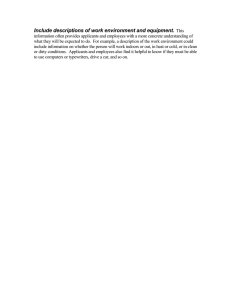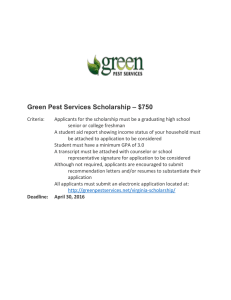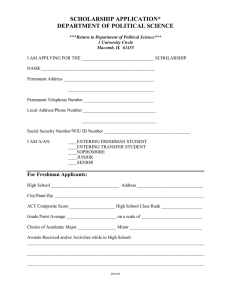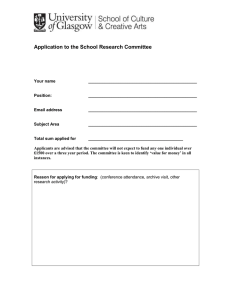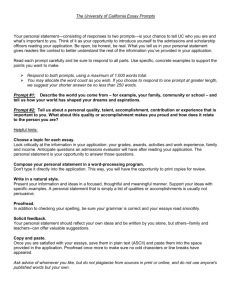Personal Statement - UC San Diego: Undergraduate Admissions
advertisement
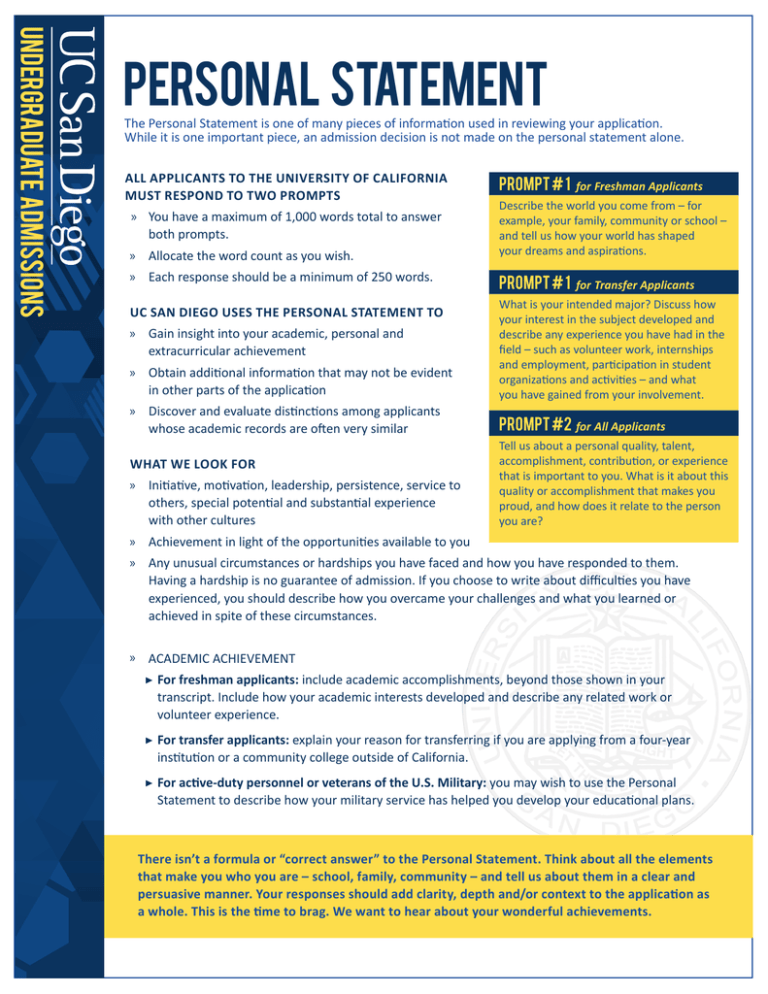
UNDERGRADUATE ADMISSIONS PERSONAL STATEMENT The Personal Statement is one of many pieces of information used in reviewing your application. While it is one important piece, an admission decision is not made on the personal statement alone. ALL APPLICANTS TO THE UNIVERSITY OF CALIFORNIA MUST RESPOND TO TWO PROMPTS »» You have a maximum of 1,000 words total to answer both prompts. »» Allocate the word count as you wish. »» Each response should be a minimum of 250 words. PROMPT # 1 for Freshman Applicants Describe the world you come from – for example, your family, community or school – and tell us how your world has shaped your dreams and aspirations. PROMPT # 1 for Transfer Applicants »» Obtain additional information that may not be evident in other parts of the application What is your intended major? Discuss how your interest in the subject developed and describe any experience you have had in the field – such as volunteer work, internships and employment, participation in student organizations and activities – and what you have gained from your involvement. »» Discover and evaluate distinctions among applicants whose academic records are often very similar PROMPT #2 for All Applicants UC SAN DIEGO USES THE PERSONAL STATEMENT TO »» Gain insight into your academic, personal and extracurricular achievement WHAT WE LOOK FOR »» Initiative, motivation, leadership, persistence, service to others, special potential and substantial experience with other cultures Tell us about a personal quality, talent, accomplishment, contribution, or experience that is important to you. What is it about this quality or accomplishment that makes you proud, and how does it relate to the person you are? »» Achievement in light of the opportunities available to you »» Any unusual circumstances or hardships you have faced and how you have responded to them. Having a hardship is no guarantee of admission. If you choose to write about difficulties you have experienced, you should describe how you overcame your challenges and what you learned or achieved in spite of these circumstances. »» ACADEMIC ACHIEVEMENT ▶▶ For freshman applicants: include academic accomplishments, beyond those shown in your transcript. Include how your academic interests developed and describe any related work or volunteer experience. ▶▶ For transfer applicants: explain your reason for transferring if you are applying from a four-year institution or a community college outside of California. ▶▶ For active-duty personnel or veterans of the U.S. Military: you may wish to use the Personal Statement to describe how your military service has helped you develop your educational plans. There isn’t a formula or “correct answer” to the Personal Statement. Think about all the elements that make you who you are – school, family, community – and tell us about them in a clear and persuasive manner. Your responses should add clarity, depth and/or context to the application as a whole. This is the time to brag. We want to hear about your wonderful achievements. UNDERGRADUATE ADMISSIONS TIPS & TECHNIQUES DO DON'T -- Start early. Allow sufficient time for preparation, revisions and careful composition. 99 Plagiarize. Ask advice of whomever you like, but do not use ideas or content from print or online sources. Use your own ideas and words. -- Think carefully about your responses. Look critically at the information in your application: your grades, awards, activities and work experience, family and income. Anticipate questions an admissions evaluator will have after reading your application. The personal statement is your opportunity to answer those questions. -- Write clearly. Present information and ideas in a focused, deliberate and meaningful manner. Use concrete examples and details to support your point. A list of qualities is not persuasive. -- Proofread. You will not be graded on grammar, spelling or sentence structure, but ensuring accuracy and flow will enhance overall presentation and readability. -- Get feedback. Your personal statement should reflect your own ideas and be written by you alone, but others — family, teachers and friends — may offer valuable suggestions. -- Use a word-processing program. Once you are satisfied with your statements, copy and paste them into the space provided in the application. Proofread once more for odd characters or line breaks that may have appeared. 99 Use creative writing. Avoid clichés, poems, scene-setting, quotes or jokes. 99 Write about events in the distant past. Unless they clearly illustrate your plans for your college career, your passion or future goals. 99 Write about other people more than yourself. It’s great to have family support or a loving friend or role model, but the personal statement should be about you. 99 Duplicate information found elsewhere in your application; instead add to our understanding of you as an individual. 99 Give a long list of accomplishments and activities. Place them in context with explanations or examples. Thoughtfully describe what you’ve done, the choices you’ve made and what you’ve gained as a result. 99 Pose philosophical questions. Get to the point and tell us what you mean. 99 Use acronyms. If we don’t know what they are your meaning may be lost. -- Use “I” statements. Talk about yourself so that we can get to know your personality, talents, accomplishments and potential for success. Student Research Centered Focused Service Public Oriented University ADDITIONAL COMMENTS BOX IS NOT A CONTINUATION OF THE PERSONAL STATEMENT USE THIS BOX TO: »» Convey information that will help us understand the context of your achievement. »» List any additional honors awards, activities, leadership elements, volunteer activities, etc. »» Share information regarding a nontraditional school environment or unusual circumstances that has not been included in any other area of the application. Your essay prompts should not be used for this purpose.
